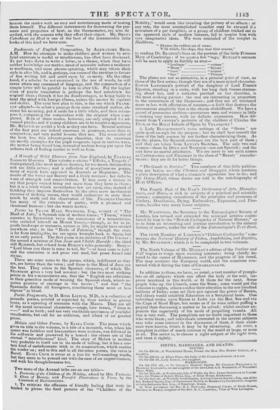Rudiments of' English Composition, by ALEXANDER REID, A.M. How far
attempts to make children good writers by arti- ficial exercises is useful or mischievous, has often been discussed. To put boys down to write a letter, or a theme, when they have neither knowledge nor matter, must of necessity induce a tendency
to wordiness, and mere phrase-spinning, which may vitiate their style in after life, and is, perhaps, one cause of the prestige in favour of fine writing felt and acted upon by so many. On the other band, if a scholar be not exercised in the use of words, be will never attain any command of language, and the composition of a
simple letter Will be painful to him in after life. For the higher
class of pupils translation is perhaps the best substitute for original ideas ; though it has its disadvantages, in being liable to taint the mind with foreign idioms, unless the master be vigilant
and skilful. The next best plan to this, is the one which FRANK- LIN adopted—to select a passage from some standard author, ab- stract his meaning, put it aside for a little while, and then recom-
pose it, comparing the composition with the original when com-
pleted. Both of these modes, however, are only adapted for ad- vanced pupils; and if young children are to be taught composition, Mr. REID'S is as useful a hook as they can have. Several sections
of the first part are indeed exercises in grammar, more than in comrosdion, and very useful lessons they are. The remainder of the book has this advantageous character, that its exercises are mostly examples for the pupil to operate upon in various ways, the matter being Ibund him, instead of urchins being rut upon the arduous task of finding matter as well as form.


























 Previous page
Previous page